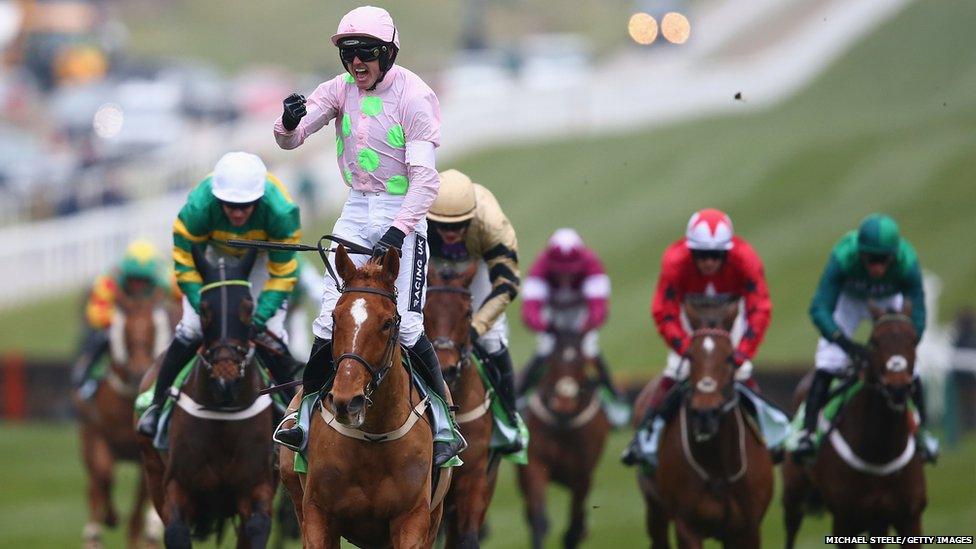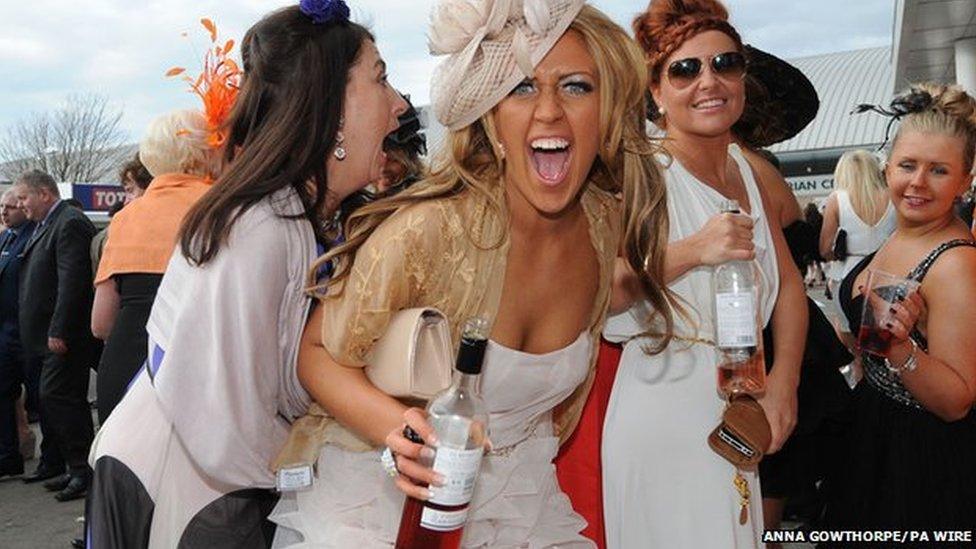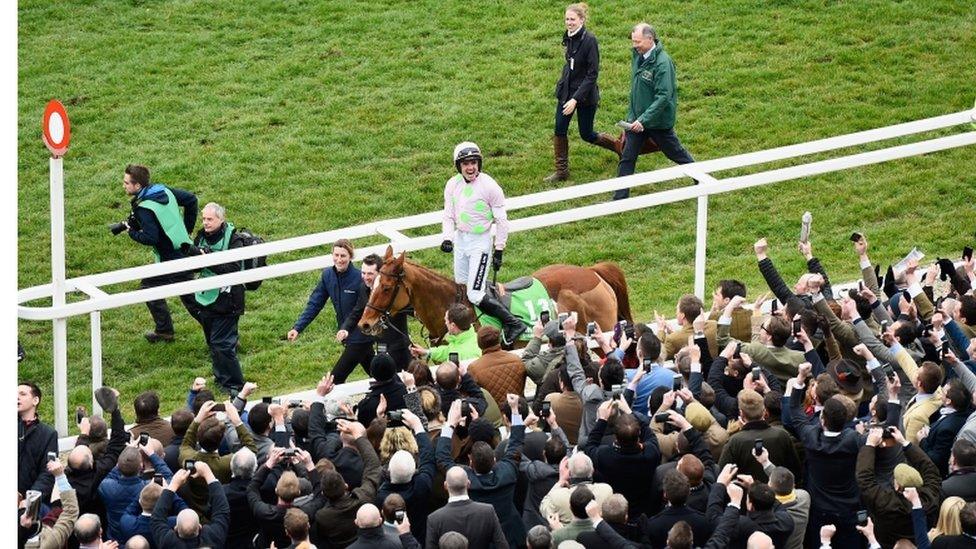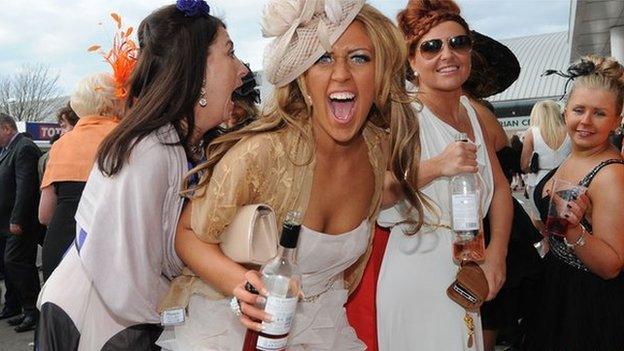Is the social scene at the races beating the horses themselves to the finish?
- Published

The players appeared to urinate into their drinks glasses before the contents were tipped over a balcony at the Cheltenham Festival
Horse racing is one of Britain's most popular sports, with up to six million people attending racecourses every year. But how many people actually go to watch the horses race?
The prestigious festivals once attracted a genteel crowd of lords, ladies and royals, but as fights break out, arrests are made and professional footballers are caught urinating in their drinks, the races can often attract the wrong headlines.
As the Cheltenham Festival opened on Tuesday, nearly 70,000 racegoers attended the event, but it was a group of footballers who made the news after they appeared to urinate into their drinks glasses before the contents were tipped over a balcony.
MK Dons player Samir Carruthers, Northampton Town's James Collins, and Luke Ayling of Bristol City are being investigated for their actions, while Cheltenham Festival cancelled a hospitality booking from the sports management company.
Carruthers and Collins have apologised over the incident.
Collins said it "emphasised the negative stereotype of the modern footballer", while Carruthers said "I've let everyone down. I'm meant to be a role model and I have to live by my actions now."

Cheltenham Racecourse director Ian Renton said: "It's totally out of place on this racecourse; it's totally out of place anywhere."
'Behave responsibly'
The Jockey Club said that "clearly this behaviour is totally unacceptable", while the sporting authority British Horse Racing said it was a "rare occurrence" but was not tolerated.
Stephen Atkin, chief executive of the Race Course Association, said racecourses "welcome their customers and encourage all to behave in a responsible manner".
He said the association and its member racecourses were involved in the first major sport to form a partnership with Drinkaware, the charity promoting responsible drinking, and the Pace Yourself campaign had been adopted by members.
Cheltenham Racecourse director Ian Renton told the BBC: "It's the last thing we want to see on the front of the papers after an extraordinary good day's racing. It's totally out of place on this racecourse; it's totally out of place anywhere.
"We have very strict terms and conditions for the general public coming to the racecourse - we expect them to behave and not cause any disturbance to others. We had 68,000 people here and in general their behaviour was exemplary."
The link between footballers and racing is a strong one, with Wayne Rooney, Joe Cole, Michael Owen and Sir Alex Ferguson being among those who have turned their hand to owning horses.

Ruby Walsh celebrates after riding Annie Power to victory on Champion Day of the Cheltenham Festival
For corporate sponsors, their aim is to promote the social side of the event.
Private box packages range from £100 per person to over £6,000 per box at different racecourses.
John Walker, managing director of Racecourse Hospitality, said: "It's how the world has changed - people have more of a disposable income now. You don't need to know a lot about sport, it's just a great day out.
"Many people go there and don't even see a horse. The racecourse is just the venue - after that it's down to socialising and the entertainment.
"It's the smaller races that see a higher proportion of racing fans from the country. For the big festivals it's just a huge social occasion."
He said it was not the racing that made people behave badly.
"There's a dress code, and when the gentlemen wear a jacket and tie and the ladies wear a dress, it promotes better behaviour and helps add to the sense of occasion."

Etiquette at The Races
Race meetings have various codes of conduct and levels of formality. Debretts, external, a "source on British social skills, etiquette and style", advises:
Adhere to the correct dress code for the area of the racecourse for which you have a ticket. A day at the races is a special occasion and you should dress smartly
Keep loud shouting or excited screaming to the minimum - especially if you're very close to other people
Have a flutter but moderate any excessive reactions. If you've staked your money on a loser, don't sulk or give way to petulance or moodiness. Accept your loss with equanimity and move on
Pace yourself. Break up your forays to the racetrack, the winning post or the winner's enclosure with a chance to sit down, relax and enjoy the refreshments on offer
Don't over-indulge. Several hours of drinking on a summer's afternoon can be highly intoxicating and you don't want to make an exhibition of yourself

When it comes to women attending Ladies' Day events, many have made headlines for more than just their outfits.

Aintree racecourse boss John Baker said the venue wanted to protect women from "unfair" coverage
In 2014 Ladies' Day at Ascot reportedly "descended into a booze-soaked free for all", external.
Other pictures making the national press, external on Wednesday were of glamour model Katie Salmon and ex-Love Island star Jessica Hayes, who were with the players, flashing their breasts for the camera.
But race bosses are keen to protect the reputation of race events, and its attendees.
Last year Aintree racecourse boss John Baker said the venue wanted to protect women at the world's biggest steeplechase from "unfair" coverage.
He said any photographers taking shots which enforced negative stereotypes could have their accreditation revoked.
A British Horse Racing spokesman said: "Racing offers something for everyone and we find that race goers enjoy all aspects of a day at the races, including the magnificent spectacle of thoroughbred racehorses competing on the track, the thrill of having a bet on those races and racing's famous social scene."
- Published16 March 2016

- Published12 April 2015

- Published26 March 2015
